- Home
- Karin Kallmaker
Above Temptation Page 15
Above Temptation Read online
Page 15
“Not you. There’s no reason for you to empty an account and it’ll just look guilty. This is about me so let’s keep it that way as much as we can. Exit west on Denny. My banks are there, and I can make a cash withdrawal that will likely see us into another car and a hotel for a few days.”
“We don’t need a hotel. I have something better in mind. But we’ll need supplies.” She followed Tam’s directions and pulled into a parking space outside a local bank. “I’ll have some clothes, but you’ll need something more than a suit.”
“Where?”
Kip decided she could be mysterious too. “You need flannel. Lots and lots of flannel.”
“I like flannel.”
She nearly said that she liked women who liked flannel, but thought better of it.
* * *
Tam tossed Kip a reassuring smile over her shoulder as she went into her bank. She knew where Seattle Central Savings and Loan ranked in the Federal Reserve Bank’s posting order in District 12—almost last, since they were small. If she used a withdrawal slip, not her ATM card, she could get more cash and it would take hours longer to show up to those monitoring her financial activity. ATM and credit card activity were reported almost instantly.
“Off to Vegas,” she told the teller when she presented her slip.
Without any special reaction, the teller asked if she wanted it in hundreds.
She did. A few minutes later she walked out the door with just under the federal reporting limit of ten thousand dollars in cash.
She paused at Kip’s driver door, and after Kip lowered the window explained, “My regular bank is just across the street. I’ll walk over. Why don’t I meet you in the department store lot?”
Kip was clearly anxious, but agreed. “We have to get you some clothes anyway.”
If Tam had wanted to, she could have pretended it was just any other day. She was out enjoying the crisp fall air, running errands, doing a little banking. On foot because it was a beautiful day and she would shortly be off on an adventure with an attractive, passionate woman.
That’s the way it should have been, anyway, for some other woman. For more reasons than one, Tam had never been much like other women.
She repeated the Vegas line, accepted another stack of bills and tucked it in her other inner jacket pocket. Cash was annoyingly bulky, but it had certainly been easier to catch bad guys when it was the preferred way to move funds.
Kip was waiting at the department store doors. “I have extras of everything where we’re going, so you don’t need much. It’s forested and gets quite cold at night so you’ll need warm layers.”
“And there’s a satellite signal?”
“No,” Kip said seriously. “No, there’s no signal at all out there. We can crack this case without the World Wide Web.”
“I need—oh. You make joke.”
“You ask silly question so yes, I make joke.”
“You sounded like Mercedes.”
“Why thank you,” Kip said. She was smiling.
In less than thirty minutes Tam acquired sweats, jeans and a flannel shirt, plus some long-sleeved tees and undergarment necessities. It was only another thirty minutes before they’d stocked up on basic groceries and cans of soup. A few blocks away they ducked into a large electronics store and Tam, aching over the loss of access to her beautiful laptop sitting in her abandoned car, purchased a microcomputer with high-end processors and embedded wireless. A small wireless printer and several reams of paper finished the purchase.
“That was efficient.” Kip shoved the last bag into the trunk. “So what are we going to do about my car? If they get serious, they’ll be looking for it. I made it easy—it’s LoJacked.”
“A sensible precaution, but problematic for us.” She pushed the trunk closed.
“I didn’t expect to be on the run from the law.”
Tam settled into the passenger seat. “We’re not on the run from the law. We’re just avoiding finding out for sure that they’re looking for either of us.”
“That’s comforting.” Kip’s grip was tight on the wheel as she backed out.
“It’s not too late,” Tam said.
“I’m anxious. I’m just venting.”
She studied Kip’s expression. The line of her lips was steady, but her fine eyebrows were drawn together by a deep crease of worry.
“I do that a lot,” Kip added. “Probably from living alone. I talk to myself way too much. Do you do that?”
“No,” Tam said. “Silence was rewarded when I was a kid.” A major understatement, she thought.
Kip turned them southward, toward Tacoma. Finding a used car lot wouldn’t be hard once they left Seattle behind. “Cell phones,” she said abruptly. She fished in her pocket, one hand on the wheel and handed the device to Tam. “Pop the battery.”
“I should have thought of it,” Tam admitted. The GPS locator was its own form of LoJack for people.
“That reminds me.” Kip turned into a strip mall. “I have to make a couple of calls. There might be a land line at that Laundromat.”
Tam had no reason to think Kip was going to turn her in, but the worry crossed her mind. She wanted to know that Kip trusted her, but she was still not very good at reading Kip’s expressions. “I may as well call my people, too.”
There was a pay phone next to the Laundromat’s change machine, and Kip went first. Tam moved off a bit so as not to eavesdrop, but there were no customers using machines so Kip’s voice carried.
“Hi, Jen, I am really sorry to do this to you, and I hope you haven’t gone to a lot of trouble, but I have to cancel dinner tomorrow night. If you already made the cake maybe you can freeze me a slice? I’m so sorry, it’s… I have to go out of town unexpectedly. Please don’t worry.” Kip’s voice trailed away for a moment. “I know you’re at work. And…if… It’s just that… You’re the one who always says don’t trust what you read in the papers, okay? Remember that, okay?”
Tam heard the tremor in Kip’s voice. She wished with all her heart that none of this stuck to Kip. She was trying to do the best in an untenable situation. Once again, Tam knew Kip’s best bet would be to go to the FBI right now and just tell them what she knew. Tam couldn’t find the strength of will to order her to go, though. She needed Kip, for selfish reasons—she believed Kip could help prove her innocence and find where the money had been transferred. It was all about the investigation. Sure it was.
“Kim? I’m surprised to catch you.”
Kip’s tone was so markedly different that Tam couldn’t help but listen. A bitter-edged sarcasm she hadn’t heard from Kip before was pronounced.
“Lost another job? Inconvenient work schedule again?” Kip listened, her back rigid and shoulders tense. “I need you to give a message to Dad. He isn’t? Oh. Sure, it’ll work this time. The last dozen trips to detox worked too.”
Tam was sorry she was eavesdropping. No wonder Kip didn’t drink. She was doubly glad Kip didn’t know about the hangover. At least her headache had subsided to a dull throb.
“Just tell him I’m going out of town. I can’t tell you why and don’t be surprised by anything you hear.”
She turned from the phone, her expression still stormy. “All yours.”
Tam had decided on her best course of action for the least amount of contact. She dialed into her mobile’s voice mail, then used the group function to send the same message to Diane, Hank, Ted and Mercedes. “Greetings to all of you. I’ve decided that I need a mental health break. I know you will all carry on with your assignments as we’ve discussed while I’m away. If you’re unclear on next steps, confer with each other. I don’t expect to be off the grid for more than a couple of days. Mercedes, my car wouldn’t start. It’s at a parking meter on the four hundred block of Marion. I’d be grateful if you could have it towed to a mechanic.”
“That’s it?” Kip led the way back to the car.
“They’ll understand and talk amongst themselves. I expect them to be the c
avalry.”
They were settled and heading for the southbound freeway when Tam asked, “So your sister’s name is Kim? I didn’t remember that from the report.”
“Yes, after the Kipling book. I’ve often thought I should have been the one named after the secret agent. I loved that book. Read it dozens of times.”
“I like Kip. It suits you.”
Kip flashed her a surprisingly shy smile. “I like it too. My grandfather would call me his little Kipling, like duckling or halfling.”
“He sounds like an amazing man.”
“Absolutely, he was. I saw him on TV once, a few feet behind Reagan. He looked so tall and so strong. I think I was six and he was like a Knight of the Round Table. Everything noble and good.”
“Maybe it’s a good thing you like women. Hard for a guy to compete.” Hell, Tam thought, it was hard for a woman as well. She’d already tarnished her armor with kisses that shouldn’t have happened.
Kip grinned. “I never thought of it that way.” She colored slightly, then went on, “He was gone a lot. We lived with my grandparents, but he wasn’t home much. My grandmother—my mom’s mom—kept us fed and when he died, I think it was good she had Kim and me to fuss over.”
“I couldn’t help but hear. Your father wasn’t in the picture much?”
“Hardly at all. He ran away when my mother got pregnant with me. They never married. He would show up when he was out of drinking money. He could be charming and my mother was snowed for a while, I guess, because I’ve got a little sister, two years younger than me. But he took off again. She devoted herself to local causes for children. I think it was easier to deal with other people’s kids than her own. After all, we both looked a lot like the man who’d abandoned her. She’d been on the path to taking religious vows when she met him. That would have been a happier life than the one she had.”
From Kip’s tone alone, Tam guessed her mother had passed away. “When did she die?”
“The year I went away to college. She caught meningitis and shouldn’t have died, and somehow did anyway. My sister was never all that strong, but she went to pieces, and our father showed up for one of his rare visits. They’ve enabled the worst in each other ever since. I don’t want to know how she earns money. She never keeps a job.”
“She sounds mentally fragile.”
“Yeah, well, it was certainly always easier to be fragile than to pull her own weight.” Kip paused. “I’m sorry, I know that sounds harsh. I’ve always felt like I had to grow up because she refused to. I had my first job at sixteen, saved up for a car, and gave her rides to her jobs, which turned into me being the one making her go to work. So when she decided a job sucked, I sucked too. Keeping my distance has been easier on both of us.”
Tam digested the information, none of which surprised her. It sounded like Kip had quickly become the adult in her household, at a young age. She could imagine what that was like, but had no experience of family life for comparison. The New England boarding school where she’d been placed after the adoption had required growing up, but she’d only been responsible for herself. “And Jen’s a friend?”
Kip nodded. “If I have a best friend, she’s it. She works hard at making sure I don’t completely drift away. Her boyfriend is not one of my fans. My turn for a question.”
“Okay.” Tam felt a coil of worry form in her stomach. She wasn’t good with questions, but she wanted to give Kip answers.
“The Maldives account?”
Relieved, she explained. “I received a financial reward for finishing college. I was capable of earning my living and I didn’t actually want the money. I figured if I put it a long way away, if I did need it I’d have it.”
“Was it from your German family or something?”
The perceptive question gave Tam a moment’s pause. “Yes, relatives. Something like that.”
The frown on Kip’s face told her that her answer wasn’t entirely satisfactory. “Another question, then—this has been bugging me all day. Why Wren Cantu?”
“She’s a celebrity, I guess. She was apparently at some function the New York office put on. Maybe known for expensive tastes and illicit substance use. It’s more sensational.”
“But if she’s an innocent bystander why single her out when her own people will refute the claim as well?”
“She’s apparently a lesbian, so maybe the master planner thought some homophobia on the part of the masses would bring more scrutiny. Harassment for her, or the FBI digs into her life and finds something else equally interesting. Honest, I’d never heard of her until that reporter called.”
“I have a workup on her. I never even got to read it. Maybe something in it will tell us why she was made a target. We could finally get lucky and go from why to who.”
They drove for a bit talking in fits and starts. Tam found it hard to believe that some people were likely still having lunch. It was strange, too, that the vivid greens of the pines and sharp golds and oranges of maples were so bright, like the colors had never reached her eyes before. For most of her life, she’d felt on one side of a dimming pane of glass that protected her and let her be very good at her work. But clearly it had also leeched the world of vibrancy. Sitting next to Kip the separation was gone. Even the whisper of the tires on the pavement held a kind of music she’d never appreciated before.
“So where are we headed—some place a friend owns you won’t be tracked to?”
Kip, who was craning her neck to see if the used car dealership they both remembered was at the next exit, shook her head. “No, it’s a property registered to a little company my grandmother owned called Barb’s bon bons. She made wonderful candies and had a little shop for a while, then sold them out of her home by mail order. After she died I thought the registered name might be useful. Plus I didn’t want anyone else using it.”
She laughed before continuing. “I liked making candy with her. I never wanted to be a candy maker, though. The company was a part of her I didn’t have to say goodbye to, so I paid the little bit of fees to keep it open. And when I decided to invest in some property, there were some tax advantages to having the company own it instead of me. Even the utility bill goes to the company’s post office box.”
Tam pointed at the exit signs coming up. “I think the second one is where the used lots are.”
“I think you’re right.”
“It does seem to me that your hideaway is much like my Maldives account. We had good reasons, but it looks suspicious to a suspicious person.”
“Oh.” Kip sounded genuinely surprised. “I hadn’t thought of that. I guess it does look suspicious. I was practicing the American tradition of tax avoidance.”
“And that’s not a crime.”
Her expression suddenly serious, Kip said, “I’ve never committed a crime if you don’t count parking tickets. It makes me very dull, I guess.”
“The majority of people are just like you.” Tam hesitated. Kip seemed very vulnerable on the subject. “You play fair, by the rules.”
“Or I don’t take chances. I don’t push the limits. I’m not changing the world. That’s my father’s point of view, anyway, when he’s putting sentences together. Wanted to know why I wasn’t out there barricading the streets when they voted down gay marriage.”
Tam laughed. “You do what you’re best at. You—everything we do at SFI—is about keeping the world in one piece, following the rules that are supposed to keep everyone honest and people’s money safe. We’re as necessary as the visionaries. There’s a reason we don’t take cases if the client won’t agree to prosecution. I look at some of our own employees who planned to retire at sixty-two or sixty-five, and now they’re working until they’re seventy, and that’s because their life savings devalued by half because a bunch of people played roulette with their money and not one of those people has been punished in any meaningful way.”
Embarrassed by how impassioned she’d become, Tam lowered her voice and said, “It just kills m
e. I wish I had a way to right that wrong. To take a couple billion dollars worth of bonuses now being handed out to some of the same people who are going to do the same things all over again, because there’s no downside for them if they screw up. Somehow spread that money around to people who lost more than they could afford. People who played by the rules, all their lives.”
“Could you do it?” Kip looked half serious.
Tam snorted. “What are you trying to get me to admit to?”
“It’s just a question.” She signaled to change lanes for their exit.
She shrugged. “Okay, it’s not like you didn’t know. If I knew where the money was and where it should go, I could do it. I could pull the biggest Robin Hood ever.”
“I wasn’t planning on doing that this weekend,” Kip said. Her eyes were shining with amusement. “Besides, that would make me Maid Marion, and that’s just not a role I’ve ever aspired to.”
“Oh, you want to be Robin Hood too, admit it.” She pointed at a billboard for a car dealership at the next stoplight.
“No, not really. I want to be the Sheriff of Nottingham—but an honest one.”
Tam laughed and it sounded different to her own ears. Like she really meant it. Wasn’t just going through the motions of expected behavior. She would have to think on it more, because something had changed. And she liked it.
Maybe, what was left of her common sense suggested, she should figure out how to get through the next few days and stay out of prison first.
* * *
Kip avoided the potholes of the dealership’s lot. The cars were dusty, and some of them clearly were freshly painted taxis. It looked exceedingly seedy to her, but that was in their favor. No electronic filing of ownership papers with the Department of Licensing. She was betting someone took the day’s changes of ownership forms in to be filed the next business day. With any luck no one would suspect they had a different car until Monday. They might even be back in Seattle by then.
Within minutes Tam had convinced an eager salesman her car had been totaled the day before and she needed to buy a basic replacement right away. It even sounded plausible that she was paying in cash to get the best deal. Kip noticed how smoothly she lied. It was disquieting, but it was necessary. They were only trying to buy themselves a couple of days to keep working on the case. Kip thought there was a good chance they could recover the funds, especially if Tam really was as good as she said she was.

 Finders Keepers
Finders Keepers My Lady Lipstick
My Lady Lipstick Because I Said So
Because I Said So Blue Collar Lesbian Erotica
Blue Collar Lesbian Erotica Just Like That
Just Like That In Deep Waters_Cruising the Seas
In Deep Waters_Cruising the Seas Sugar
Sugar Love by the Numbers
Love by the Numbers Christabel
Christabel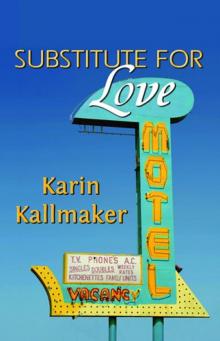 Substitute for Love
Substitute for Love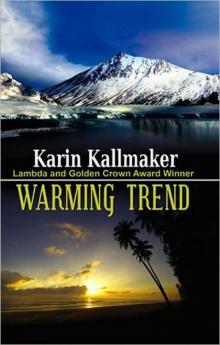 Warming Trend
Warming Trend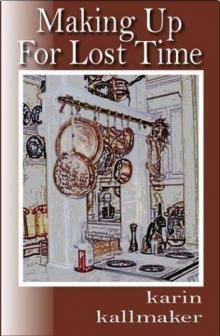 Making Up for Lost Time
Making Up for Lost Time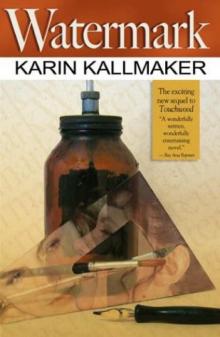 Watermark
Watermark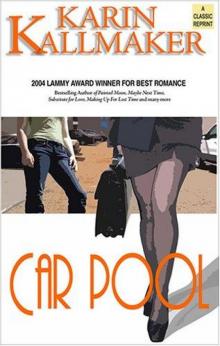 Car Pool
Car Pool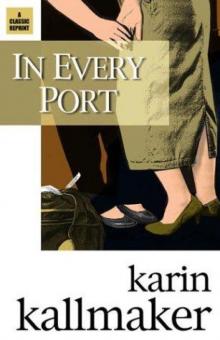 In Every Port
In Every Port Paperback Romance
Paperback Romance Roller Coaster
Roller Coaster Frosting on the Cake
Frosting on the Cake One Degree of Separation
One Degree of Separation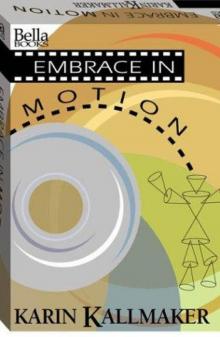 Embrace in Motion
Embrace in Motion Touchwood
Touchwood Above Temptation
Above Temptation Painted Moon
Painted Moon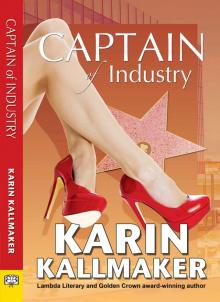 Captain of Industry
Captain of Industry The Kiss That Counted
The Kiss That Counted Wild Things
Wild Things